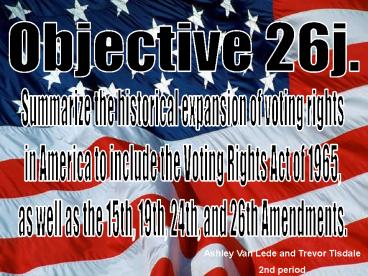Objective 26j. - PowerPoint PPT Presentation
1 / 23
Title:
Objective 26j.
Description:
Ashley Van Lede and Trevor Tisdale 2nd period Between 1965 and 1969, the Supreme Court issued several key decisions upholding the constitutionality of Section 5 and ... – PowerPoint PPT presentation
Number of Views:80
Avg rating:3.0/5.0
Title: Objective 26j.
1
Objective 26j.
Summarize the historical expansion of voting
rights in America to include the Voting Rights
Act of 1965, as well as the 15th, 19th, 24th,
and 26th Amendments.
Ashley Van Lede and Trevor Tisdale 2nd period
2
Voting Rights of 1965
Between 1965 and 1969, the Supreme Court issued
several key decisions upholding the
constitutionality of Section 5 and affirming the
broad range of voting practices for which
preclearance was required. The law had an
immediate impact.
3
Voting Rights Cont.
By the end of 1965, a quarter of a million new
black voters had been registered, one-third by
Federal examiners. By the end of 1966, only 4 out
of the 13 southern states had fewer than 50
percent of African Americans registered to vote.
The Voting Rights Act of 1965 was readopted and
strengthened in 1970, 1975, and 1982.
4
(No Transcript)
5
(No Transcript)
6
(No Transcript)
7
(No Transcript)
8
15th Amendment
Section 1. the right of citizens of the United
States to vote shall not be denied or abridged by
the United States of by any state on account of
race, color, or previous condition of
servitude. Section 2. The congress shall have
power to enforce this article by appropriate
legislation.
9
15th Amendment Cont.
The 15th Amendment was the last of the
Reconstruction Amendments to be adopted. It was
designed to prohibit discrimination against
voters on the basis on race or previous condition
of servitude.
10
15th Amendment Cont.
- It did not guarantee blacks the right to hold
office, which many congressmen felt should be
included.
11
15th Amendment Cont.
- It did not offer a blanket guarantee of the right
to vote because many Radical Republicans feared
that would void the disenfranchisement of
ex-Confederates. Many states, North and South,
required payment of poll taxes, property
ownership, or literacy as a condition of voting.
12
19th Amendment
The right of citizens of the United States to
vote shall not be denied or abridged by the
United States of by any state on account of
sex. Congress shall have power to enforce this
article by appropriate legislation.
13
19th Amendment Cont.
Beginning in the 1800s, women organized,
petitioned, and picketed to win the right to
vote, but it took them decades to accomplish
their purpose. Between 1878, when the amendment
was first introduced in Congress, and August 18,
1920, when it was ratified, champions of voting
rights for women worked tirelessly, but
strategies for achieving their goal varied.
14
19th Amendment Cont.
Passed by Congress June 4, 1919, and ratified on
August 18, 1920, the 19th amendment granted women
the right to vote.
15
(No Transcript)
16
(No Transcript)
17
24th Amendment
Section 1. The right of citizens of the United
States to vote in any primary or other election
for President or Vice President, for electors for
President or Vice President, or for Senator or
Representative in Congress, shall not be denied
or abridged by the United States or any State by
reason of failure to pay any poll tax or other
tax. Section 2. The Congress shall have power to
enforce this article by appropriate legislation.
18
24th Amendment Cont.
In the Southern states that passed these laws,
each voter was charged the same amount of poll
tax. Well-to-do and rich citizens could afford to
pay the tax, but blacks, many of whom were poor,
couldnt.
19
24th Amendment Cont.
Some poll taxes were cumulative, so if a citizen
didnt vote one year, but tried to vote in the
next election, he/she would be charged the
accumulated poll tax from that previous election
along with the tax for the current one. This made
it impossible for many blacks to vote.
20
24th Amendment Cont.
Congress had been trying to get rid of the poll
tax since 1939, but didnt succeed until the
Civil Rights Era. Although only five states still
had a poll tax by this time, Congress argued that
a Constitutional amendment was needed to
eliminate it altogether. The 24th Amendment was
ratified in 1964, during the Johnson
Administration.
21
26th Amendment
Section 1. The right of citizens of the United
States, who are eighteen years of age or older,
to vote shall not be denied or abridged by the
United States or by any State on account of
age. Section 2. The Congress shall have power to
enforce this article by appropriate legislation.
22
(No Transcript)
23
(No Transcript)































